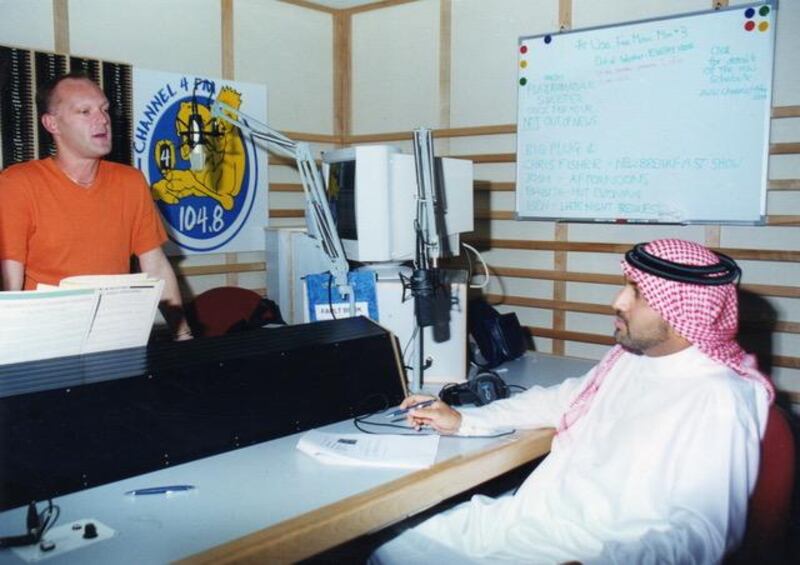On a warm summer's day in 1997, the sounds of Republica's Ready to Go blasted out across the country. It was the year that the United Kingdom handed Hong Kong back to China; IBM supercomputer Deep Blue beat Russian chess grandmaster Garry Kasparov; while here, 104.8 Channel 4 FM was launched.
"It was something people had been crying out for. It brought fresh young voices and a top 40 forty format," says Rick Houghton, Channel 4's programme director in 1997.
"All the hits across the UAE" ran the slogan of the country's first commercial radio station. Channel 4 was founded by Abdullah Murad, owner of Channel 4 Television in Ajman, while Mekki Abdullah was the man tasked with operating the station. More than 20 years on, Houghton recalls the fraught days leading up to launch on June 7. Just days before the station went live, the transmitter failed. "Mekki went grey overnight as there was so much anticipation. There were all kind of dramas," he says.
The establishment of Channel 4 must also be considered in the context of the time. There was no Dubai Marina, the Burj Al Arab was under construction and Saadiyat was still an undeveloped island. It was a time when the UAE was rapidly developing. It made sense, therefore, for a commercial radio station to begin operating.
Long-time UAE presenter Dave Cleary was the second person on air that day – taking the mic from Houghton at midnight. He was just 18. At this time, Dubai FM and Capital FM in Abu Dhabi were broadcasting. For Cleary, however, these stations were more like community-radio networks. Channel 4 introduced formatted radio, music playlists and brought in competitions for gold bars and the like. "No disrespect to stations at the time, but radio was kind of stuck in the dark ages. It hadn't evolved," Cleary tells me. "The presenters of the other stations could play whatever they wanted. We had a format; we did not choose our music. It was categorised for the market."
One of the early presenters that took to the role with relish was Jonathan Miles. Miles presented the drive-time show on the station from 1998 to 2001. When I talk to him on the phone from the UK, Miles remembers a simpler, freewheeling time. "It was kind of magical. When I went to work in Dubai, people said: 'Where?' Now it's: 'Oh I've got to go there.'"
Miles became something of a celebrity in the broadcasting world here, known for his witty, irreverent radio style. "You are told all sorts of stuff when you arrive: don't do this, don't do that, don't do the other. And you go on the air absolutely terrified," he says. "You weren't supposed to mention God. But I'd turn it around, and if I was talking about the Pope, I'd say: 'You know the bloke in Rome with the big hat.' Because I was different, that's how I became infamous."
The style of Miles and the other presenters swiftly gained favour with listeners," Houghton says. "This was also the breakout era for mobile-phone use and instant listener engagement was on the rise.
"Back in 1997, we were exploring the very start of the internet. We didn't have a website yet. But we knew how crazy everyone in the UAE was about mobile phones so we were quite quick to pick up on text messages. A lot of people were keen to phone up and get involved..
"I'm really proud of what we did. We were up against it to launch the thing. It's something I look back on as a really great, fun period in my life and we felt like pioneers. We brought something new and different to the landscape."
Twenty years on, the broadcast landscape has been completely transformed. There are new stations; online-only platforms; podcasts; and people can download and listen to shows on their smartphones. But Channel 4 is still broadcasting. In May, the team broke the Guinness World Record for the longest underwater live broadcast. Recorded at Atlantis The Palm, it lasted for five hours, 25 minutes and 25 seconds.
For Cleary, now working at Dance FM in Dubai, what Channel 4 did was help professionalise the broadcast scene. "Back in the day, radio was not taken seriously," he says. "People thought it was a working holiday for radio DJs either struggling, out of work or running away from something. Now, radio in Dubai is better than a lot of stations across the UK, Australia and other parts of the world. It's very difficult to get a job in radio here now."
"Channel 4 was a game changer. Twenty years later, they are still on the air, still sounding great, still going strong."
John Dennehy is the editor of Weekend.






